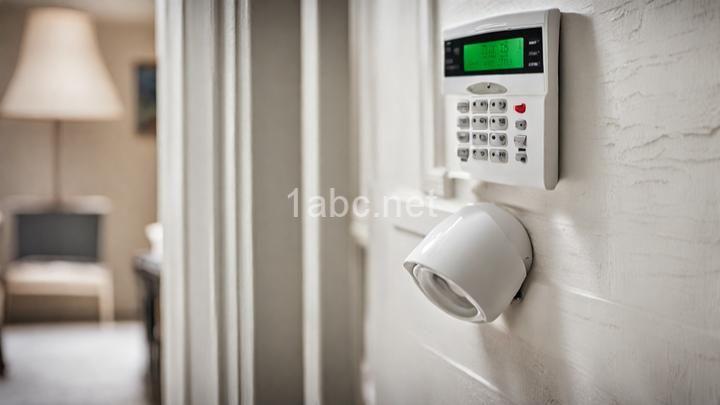The Top Features to Look for in Wireless Home Alarm Systems

Introduction:
Dear reader, welcome to our blog post where we will dive deep into the world of wireless home alarm systems and explore the top features you should look for when choosing one for your home. Home security is a paramount concern for all homeowners, and wireless alarm systems have revolutionized the way we protect our properties. In this article, we will discuss the key features that make wireless alarm systems stand out from the traditional wired ones. So, let's get started on our quest to find the perfect wireless home alarm system that will provide you with peace of mind and enhanced security.
I. Convenience and Ease of Use:
When it comes to home security systems, convenience and ease of use are crucial factors to consider. Gone are the days of complex and time-consuming installations. With wireless alarm systems, you can bid farewell to drilling holes and running wires through your walls. Look for a system that offers wireless connectivity, allowing you to place sensors and cameras wherever you need them without the hassle of wiring.
Furthermore, opt for a wireless alarm system that provides mobile app control. This feature allows you to manage your security system from your smartphone or tablet, giving you complete control even when you're away from home. With just a few taps, you can arm or disarm your system, monitor live feeds, receive notifications, and even adjust settings. The intuitive user interfaces of modern wireless alarm systems make it easy for homeowners of all tech-savviness levels to operate their security system effortlessly.
II. Comprehensive Coverage:
When it comes to protecting your home, comprehensive coverage is essential. A wireless alarm system should offer a range of sensors and detectors to ensure the security of different areas of your house. Look for systems that include multiple sensors, such as motion detectors, door/window sensors, and glass-break sensors. These sensors work together to detect any unauthorized entry or movement within your property.
Additionally, consider a wireless alarm system that integrates with closed-circuit television (CCTV) cameras. This integration allows you to monitor your property both inside and outside, providing an extra layer of security. With CCTV integration, you can access live camera feeds through your mobile app and receive alerts if any suspicious activity is detected.
III. Smart Integration:
In today's interconnected world, smart integration has become a sought-after feature in wireless home alarm systems. Look for systems that can seamlessly integrate with other smart devices in your home. One popular integration is compatibility with voice assistants like Alexa or Google Assistant. This allows you to control your security system using voice commands, making it convenient and hands-free.
Imagine being able to arm your system or check the status of your sensors simply by speaking to your home assistant. You can also create automation scenarios where your security system arms itself automatically when you leave home or disarms when you return. Smart integration not only enhances the convenience of managing your security system but also allows you to create a truly interconnected smart home ecosystem.
IV. Customization Options:
Every homeowner has unique security needs, and a good wireless alarm system should offer customization options to cater to those needs. Look for systems that allow you to personalize settings based on your preferences. Adjustable sensitivity settings, for example, enable you to fine-tune the response of your sensors to minimize false alarms while ensuring maximum security.
Personalized alerts are another valuable customization feature. You should be able to choose the type of notifications you receive, whether it's a text message, email, or push notification on your mobile app. This ensures that you are always aware of any security events happening at your home, even when you're not actively monitoring the system.
Flexible arming and disarming options are also important customization features. Some wireless alarm systems offer modes like "Home," "Away," or "Night." These modes allow you to arm specific sensors while disabling others based on your needs. For example, you can arm only the perimeter sensors when you're at home, giving you peace of mind while you sleep.
V. Reliable Monitoring Services:
An alarm system is only as good as its monitoring services. Look for a wireless alarm system that offers reliable monitoring options. 24/7 professional monitoring ensures that your home is always under surveillance, even when you're not available to monitor it yourself. In case of any security threats or emergencies, a professional monitoring team will respond promptly and take appropriate action.
Alternatively, some wireless alarm systems offer self-monitoring through mobile apps. This feature allows you to receive notifications directly on your smartphone and monitor your security system in real-time. While self-monitoring puts you in control, it's important to note that you should be vigilant and ready to respond to any security events.
Conclusion:
In conclusion, choosing the right wireless alarm system for your home is a crucial step in enhancing your security and gaining peace of mind. The top features to look for in wireless home alarm systems include convenience and ease of use, comprehensive coverage, smart integration, customization options, and reliable monitoring services.
The convenience of wireless connectivity and mobile app control allows you to manage your security system effortlessly. Comprehensive coverage, achieved through multiple sensors and CCTV integration, ensures the security of your entire property. Smart integration with voice assistants and other smart devices creates a truly interconnected smart home ecosystem. Customization options provide tailored security solutions, and reliable monitoring services guarantee timely response to potential threats.
Remember, your home security is of utmost importance, and finding the right wireless alarm system can provide you with peace of mind. So, when you embark on your journey to choose a wireless home alarm system, carefully evaluate the features discussed in this blog post. Happy shopping, and may you find the perfect wireless alarm system for your security needs!
FREQUENTLY ASKED QUESTIONS
What are wireless home alarm systems?
Wireless home alarm systems are security systems that use wireless technology to connect various components. Instead of relying on wires for communication, these systems use wireless signals such as Wi-Fi, Bluetooth, or cellular networks to transmit information between the different components. This allows for easy installation and flexibility in terms of component placement. Wireless home alarm systems typically include sensors, such as door/window sensors, motion detectors, and security cameras, as well as a central control panel that communicates with these sensors. When a sensor detects a potential security breach, it sends a signal to the control panel, which then triggers an alarm, alerts homeowners, or contacts a monitoring service.
How do wireless home alarm systems work?
Wireless home alarm systems work by using radio frequency signals to communicate between the different components of the system. Here's a step-by-step overview of how they typically work:
- Sensor Detection: The system consists of various sensors like motion detectors, door/window sensors, glass break sensors, etc. These sensors are placed strategically around the house to detect any unauthorized entry or suspicious activity.
- Sensor Triggering: When a sensor detects something unusual, such as an opened door or movement, it sends a signal to the main control panel of the alarm system.
- Control Panel: The control panel is the brain of the alarm system. It receives signals from the sensors and processes them to determine whether an actual threat exists. If a threat is confirmed, the control panel triggers the alarm.
- Alarm Activation: When the control panel determines there is a threat, it activates the alarm, which can be in the form of a loud siren, flashing lights, or a combination of both. This alerts the homeowner and anyone nearby to the potential danger.
- Communication: In addition to sounding the alarm locally, wireless home alarm systems also typically have the capability to communicate with a monitoring center or the homeowner's smartphone. This is done using cellular or internet connectivity, enabling immediate notifications to be sent when the alarm is triggered.
- Monitoring and Notification: If the homeowner has subscribed to a monitoring service, the alarm system will connect with the monitoring center, where trained professionals can respond to the alarm activation. They can contact the homeowner, verify the situation, and even dispatch emergency services if necessary.
Overall, wireless home alarm systems offer convenience, flexibility, and effective security measures without the need for extensive wiring throughout the house.
Why should I choose a wireless home alarm system over a wired system?
There are several reasons why you might choose a wireless home alarm system over a wired system:
- Easy installation: Wireless systems are generally easier to install since they don't require drilling holes or running wires throughout your home. This makes them a good option for renters or those who don't want to undergo extensive installation processes.
- Flexibility: With wireless systems, you have the flexibility to place sensors and devices wherever you need them without being limited by the proximity of a wired connection. This allows for greater customization and adaptability to your home's layout.
- Reliability: Wireless alarm systems often have built-in battery backups to ensure they remain functional during power outages. Additionally, they can alert you when the battery levels are low, ensuring continuous protection.
- Remote access and control: Many wireless alarm systems can be accessed and controlled remotely through a smartphone app or a web portal. This allows you to monitor your home's security status, receive alerts, and even control the system from anywhere.
- Scalability: Wireless systems are easily expandable, allowing you to add more sensors or devices as your security needs change or as your home expands. This scalability makes them a convenient choice for homeowners who want to upgrade or modify their security systems over time.
It's important to note that while wireless systems have many advantages, they may have limitations in terms of range or susceptibility to interference from other wireless devices. Evaluate your specific needs and consider consulting with a security professional to determine the best system for your home.
Are wireless home alarm systems easy to install?
Yes, wireless home alarm systems are generally considered to be easy to install. They do not require any complex wiring or drilling, which makes the installation process much simpler. Most wireless alarm systems come with detailed instructions and user-friendly interfaces, allowing homeowners to install them without the need for professional assistance. Additionally, wireless alarm systems are often designed with DIY (do-it-yourself) installation in mind, making them accessible to individuals with little technical expertise.



